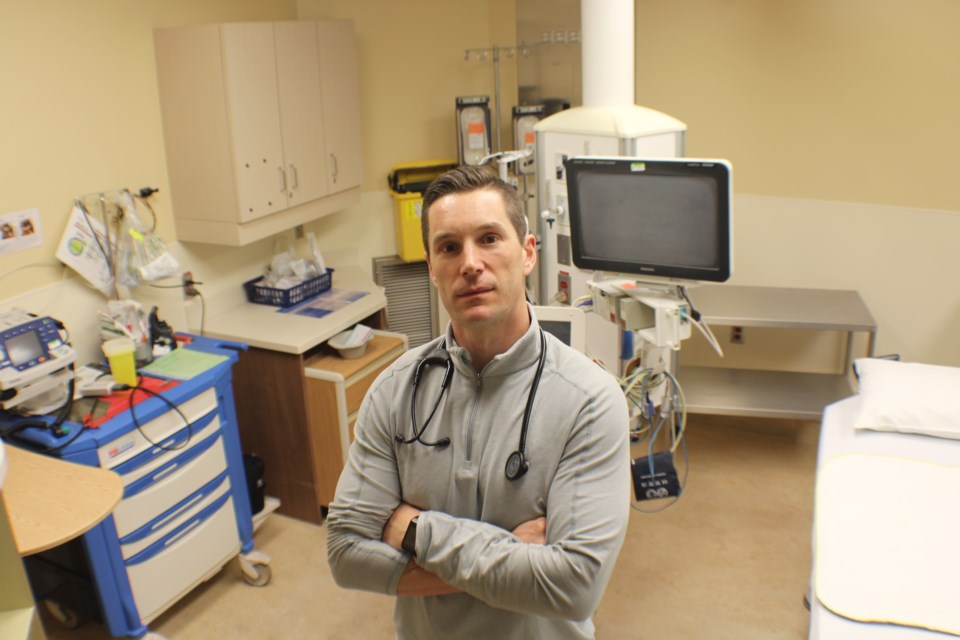Increasing rates of COVID-19 transmission in Simcoe-Muskoka coupled with the threat of the omicron variant are putting the local health-care system on alert.
“We do have quite a high surge in transmission,” Dr. Charles Gardner, Simcoe-Muskoka’s medical officer of health, said during a media briefing Wednesday. “The hospitalization has gone up a bit, not a lot, so far. But we do need to monitor that very closely.
“But it lags. You’re going to see the transmission in cases showing up before you see a rise in hospitalizations," he added.
Gardner said he's touching base with the area’s hospitals more frequently to ask not just about the numbers, but also about the issues they’re dealing with to get more a sense of the severity, or level of sickness of the patients.
Of the current 610 active cases in Simcoe-Muskoka, 33 are in hospital with COVID-19, up from 25 a week ago, with six in the intensive care unit (ICU).
Garnder pointed out that in previous waves, the number of local cases was lower than the provincial average.
But that has since changed.
Across Simcoe-Muskoka, the incidence of COVID-19 is 82.5 cases per 100,000 population per week, up from 69 the previous week. In contrast, the provincial rate is 37 cases per 100,000 population, up from 31 a week ago.
“‘I am becoming very concerned about the trajectory of things and where we’re heading,” said Gardner.
Dr. Chris Martin, chief medical director of critical care at Royal Victoria Regional Health Centre (RVH) in Barrie, said there has been no 'surge' in the number of patients with COVID-19, but there has been a gradual increase.
Currently, there are 10 patients with COVID-19 considered active at the Barrie hospital and another eight considered resolved but who remain in hospital. Of the 10, three are in the ICU, two of them on ventilators.
Martin attributes the area’s high vaccination rates in helping to limit the number of hospitalizations.
He said the delta variant and the fourth wave of predominantly unvaccinated patients is resulting in worse illnesses than earlier in the pandemic.
During the previous waves, the mortality rate of COVID-19 patients in the ICU was roughly 40 per cent. Now, with the delta strain, it’s risen to up to 60 per cent.
“The survival rate is much less than it was in the second or third waves,” he said. “Now we’re kind of on bated breath waiting to see the data on the omicron variant to see how that stacks up against delta” on its transmission and level of illness.
“We’re all a little bit disheartened to see another variant, but it was going to be a matter of time.”
With the spectre of omicron on the horizon, Martin says there's ongoing focus on adherence to prevention guidelines, including masks and social distancing, as well as the promotion of vaccination and booster shots for those who are eligible.
The expectation is that the same treatment will be used as with the delta variant. Data will show whether it will require a change in approach or medication, he said.
Prior to the pandemic, RVH had a 16-bed ICU unit, but with expansion it has accommodated up to 22 patients. The hospital also built a field hospital in the parking lot, which serves as a buffer for the region.
Meanwhile, Gardner pointed out that this is the sixth consecutive week in which the local number of cases have exceeded the provincial average.
Huntsville and Wasaga Beach had the highest incidence of cases during the week of Nov. 21, with 160 cases per 100,000 population per week followed by Barrie with 130 cases, up from 125 cases per 100,000 population the previous week.
“Barrie had an increase in incidents over the last six weeks, up from 25 cases per 100,000 population on the week of Oct. 10,” Gardner said.



